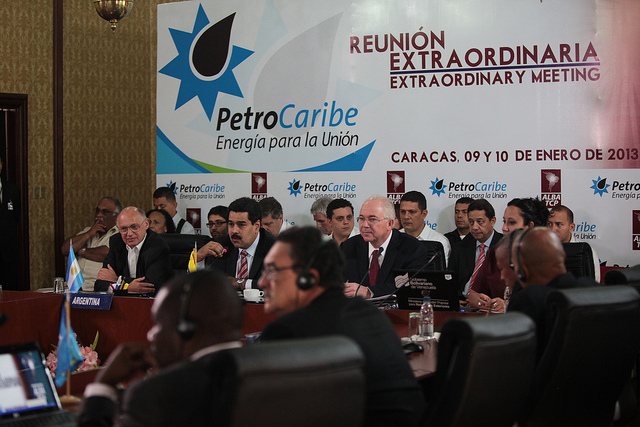“Petrocaribe and the price of energy security”
August 26th, 2013 Amidst uproar due to fears of an increase in Petrocaribe interest rates, Khadija Holder, 24, a Correspondent from Trinidad and Tobago argues that Latin America and Caribbean countries need to strengthen their energy security.
Amidst uproar due to fears of an increase in Petrocaribe interest rates, Khadija Holder, 24, a Correspondent from Trinidad and Tobago argues that Latin America and Caribbean countries need to strengthen their energy security.
July 29th 2013 found many Latin American and Caribbean countries in uproar.
At 1:41 pm Eastern Daylight Time, Platt (McGraw Hill Financial), a commonly regarded ‘highly trusted internet source in energy information’, published an article disclosing data from a source that Petrocaribe interest rates were to be increased from one and two per cent to two and four per cent.
However, after the report was later alleged to be incorrect by Jamaica’s Minister of Science, Technology, Energy and Mining, Phillip Paulwell, a sigh of relief spread throughout the region.
While the alleged new interest rate may seem ‘small’ or ‘just two per centage points’; considering the high cost and price instability of oil, such an increase can have a detrimental impact. Furthermore, these countries are already plagued by a morass of debt, economic and social hardship, and general malaise. Since 2010, Antigua and Barbuda, Belize, Saint Kitts and Nevis, Grenada and Jamaica twice have had to restructure their government debts.
According to the IMF, the region’s overall government debts as of 2013, excluding the larger countries such as Haiti, the Dominican Republic and Cuba, amount to more than 70 per cent of their gross domestic product (GDP). Jamaica’s debt reached an alarming 143 per cent of GDP in 2012. Thus it came as no surprise when Moody’s, an acclaimed rating agency, stated ‘the risk of sovereign default in the region is expected to persist as countries continue facing a combination of solvency and liquidity pressures and are increasingly unable, and unwilling, to service debt’.
Economic development, human standards, and doing-business opportunities have been no different. Youth unemployment and brain drain issues, poor diversification and institutional capacity, inefficiency, money laundering, inequality, crime, and chronic and non-communicable diseases remain relatively high within these countries.
The region is continuously struggling to move from a dependency relationship with developed and commodity trading partners, to an innovative and sustainable space. Independent of and invulnerable to foreign input, an improvement in this standing remains bleak.
Apart from such devastating realities, specific to relations with Venezuela under Petrocaribe, Latin American and Caribbean signatories continue to sustain high oil debts to Venezuela; the Dominican Republic owing circa US$3.3 billion and Jamaica roughly US$2.4 billion
Venezuela on the other hand faces economic crisis, marked by rising inflation, shortages, slowing growth, declining reserves, and uncertainty – where a good as necessary as toilet paper cannot even be accessed.
So one may question, how long can these 17 countries receive oil at comparatively low concessional rates? Moreover, would a change in Petrocaribe terms meet a strategically placed or an unprepared Latin America and Caribbean?
Truly, Petrocaribe funds have unarguably greatly benefitted its members. It has facilitated stronger infrastructure, improving social programs and living conditions, providing shared health benefits and deepening regional integration. However, this paradox of underlying energy dependence and worsening energy security that has been cultivated must be combatted. This would in turn prevent counter-productivity and improve sustainable development and prosperity indicators.
My deepest desire, should Petrocaribe terms actually tighten, is that Latin America and Caribbean signatories are in a prepared and strategic position strengthened by energy security.
photo credit: chavezcandanga via photopin cc
…………………………………………………………………………………………………………………
About me:
Discovering my great passion and ambition to advocate for global progress through research-writing stands as one of my most fulfilling attainments to date. I am currently a Research Fellow at the Caribbean Centre for Research on Trade and Development (CCRTD), a Research Consultant for JDR Research Solutions Barbados, a Researcher at Athens Development and am becoming internationally certified in Spanish and French. In my spare time I engage in volunteerism through organizations such as Junior Achievement.
…………………………………………………………………………………………………………………
Opinions expressed in this article are those of the author and do not necessarily represent the views of the Commonwealth Youth Programme. Articles are published in a spirit of dialogue, respect and understanding. If you disagree, why not submit a response.
To learn more about becoming a Commonwealth Correspondent please visit: http://www.yourcommonwealth.org/submit-articles/commonwealthcorrespondents/
…………………………………………………………………………………………………………………




